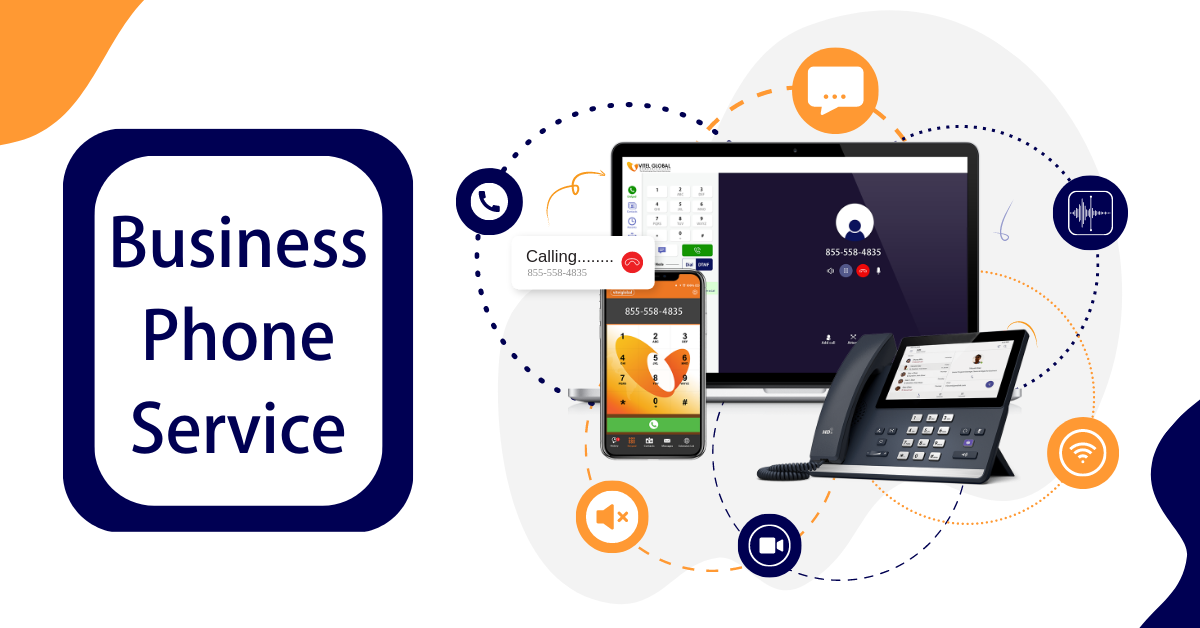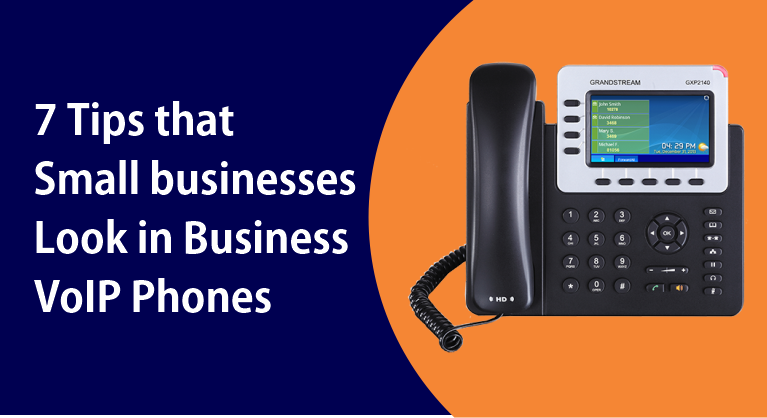Business Phone Solutions: Improving Communication and Efficiency

6 min read
Discover the power of business phone solutions! Upgrade now for improved connectivity. Small businesses are the backbone of our economy, but they often face significant challenges when maintaining effective business communication with their customers and employees. Fortunately, modern technology has made it easier for small businesses to streamline their communications and improve efficiency.
One of the most valuable tools in this effort is a phone solution-a comprehensive system designed specifically for companies that need reliable and cost-effective ways to stay connected. In this blog post, we’ll explore some of the many benefits that business phone services can offer small businesses looking to enhance their operations and achieve greater success.
Introduction
As a small business, you may use your cell phone for work calls. But as your business grows, you’ll need a more professional solution to handle more calls and features like call forwarding and voicemail. Small business phone service providers allow you to have separate phone numbers for different departments or employees, and they come with features like call waiting, caller ID and conference calling. They can also be integrated with your email and CRM systems.
Business phone solutions can help improve communication within your small business. Having separate phone numbers for different departments or employees allows customers to be directed to the right person quickly and easily. And with features like voicemail and call forwarding, you can ensure no customer call goes unanswered.
Office phone services can also help improve the efficiency of your small business. With features like caller ID and conference calling, you can save time by not having to screen calls or track down other employees for a meeting. And by integrating your business phone service with your email and CRM systems, you can automate tasks like creating new contacts and logging calls, which will free up time for you to be focused.
Consider investing if you want to improve communication and efficiency in your small business.
Benefits of Business Phone Solutions
There are many benefits. It can make it easier for employees to stay in touch, whether in or out of the office. It can lead to better customer service and more efficient operations.
Another benefit of business phone solutions is increased efficiency. With a central communication system, businesses can avoid wasting time and effort coordinating multiple phone lines and communication channels. It can free up time for employees to focus on their work tasks, increasing productivity.
In addition, it can provide valuable features such as call forwarding, voicemail, and caller ID that can make it easier for businesses to manage their communications. These Advanced VoIP features can save time and money by helping businesses keep track of their calls and avoiding missed calls.
Business phone services can help businesses create a professional image. Having a dedicated business phone number can give customers and clients the impression that your business is larger and more established than it may be. This professional image can help attract new customers and build trust with existing ones.
Types of Business Phone Solutions
There are a few different types available for small businesses. Each type has its own set of features and benefits that can be tailored to fit the specific needs of your business.
VoIP (Voice over Internet Protocol) is the most popular type. VoIP uses your existing internet connection to place and receives calls, so it’s a cost-effective solution for businesses that make many calls. It offers advanced features like call forwarding, caller ID, and voicemail.
PBX (Private Branch Exchange) systems are another popular option for small businesses. PBX systems are typically more expensive than VoIP, but they offer a wide range of features and can be customized to fit the specific needs of your business. It allows you to connect multiple phone lines and extensions, so they’re ideal for businesses that need to handle a high volume of calls.
Cloud-based business phone system is a newer option that’s becoming increasingly popular with small businesses. Cloud-based solutions are hosted off-site by a third-party provider, making them easy to set up and manage. It offers advanced features like call recording, monitoring, and more.
How to Choose the Right Business Phone Solution for Your Small Business?
As a small business, choosing the right phone is important to improve communication and efficiency within your organization. There are a few factors to consider when choosing a service, such as the needs of your business, the features offered by the solution, and the price.
Some businesses may only need a basic solution with features like call forwarding and voicemail. Other businesses may need more advanced features like call conferencing and auto-attendants. The needs of your business should be considered when choosing a small business phone service.
Many office phone services offer a variety of features. Choosing the features that will be most beneficial for your small business is important. Some features that may be beneficial include: call forwarding, call waiting, caller ID, voicemail, call conferencing, and auto-attendants.
The price of it is also an important factor to consider. Many solutions have different pricing options depending on the number of users and the features included. Comparing prices to find the most affordable option for your small business is important.
Cost of Installing and Maintaining
Regarding business communication, a system is an essential tool for small businesses. However, installing and maintaining it can be a significant expense for some small businesses. Will explore the cost of installing and maintaining it and how business phone solutions can help improve communication and efficiency for small businesses.
The cost of installing it will vary depending on the size and complexity of the system. For larger or more complex systems, the cost can be much higher. The cost of maintaining it can also be significant.
Fortunately, many systems are available that can help reduce the cost of installation and maintenance. Voice over Internet Protocol is one solution that uses your existing internet connection to make and receive calls, eliminating the need for expensive telephone lines. Additionally, VoIP systems often have features like call forwarding, voicemail, caller ID, and call waiting at no additional cost.
Another option to reduce its cost is to use a hosted PBX (Private Branch Exchange) service. Hosted PBX services provide all of the features and functionality of a traditional PBX system without expensive hardware or software. These services are
How to Make Sure Your New Phone System Is Compliant with Regulations?
There are many regulations out there that businesses must comply with, and it can be tough to keep up with all of them. But if you’re not compliant, you could face some serious consequences. That’s why ensuring your new phone system complies with all the relevant regulations is important.
Here are some tips for ensuring compliance:
- Know which regulations apply to your business. There are many different types of businesses, and each must comply with different regulations.
- Make sure your employees are aware of the regulations. It’s not enough for you to know the regulations – your employees must also know them.
- Use compliance software. There are many software programs out there that can help you ensure compliance with various regulations. Find one that’s right for your business and put it to use.
- Stay up-to-date on changes in the law. Regulations constantly change, so staying on top of any changes that could affect your business is important. Be sure to monitor the news and updates from regulatory agencies so you can make any necessary changes to stay compliant.
- Seek professional help if needed. If you’re having trouble staying compliant, don’t hesitate to seek professional help from an attorney or accountant who specializes in business
Advantages and Disadvantages of Different Types of Phone Systems
When it comes to business phone solutions, there is no one-size-fits-all solution. The type of system you choose should be based on the specific needs of your business. To help you decide which system is right for you, here are some of the advantages and disadvantages of the most popular types of business phone systems:
1. Voice IP Phone Systems
Voice over Internet Protocol is the most popular. VoIP systems use the internet to make and receive calls, which can save your business money on long-distance and international calls. In addition, VoIP systems offer many features that can improve communication and efficiency in your business, such as call forwarding, call waiting, caller ID, voicemail, and more. However, VoIP systems require a reliable internet connection and can be susceptible to power outages or other technical problems.
2. Traditional Phone Systems
Traditional phone systems are the most common type of business phone system. They use a physical network of wires and switches to connect calls, making them reliable. However, traditional phone systems can be expensive to install and maintain and don’t offer the same features as VoIP systems.
3. Hosted VoIP Phone Systems
Hosted VoIP phone systems are similar to traditional ones but are hosted by a third-party provider.
Conclusion
In conclusion, small business phone service providers can help in a great way to improve communication and efficiency. With the right setup and features, businesses can easily stay connected with their customers, partners, vendors, and employees. Plus, it’s easy to use and affordable for any budget. So if you are looking for ways to make your business run more smoothly and efficiently.
Published: April 19th, 2023
Subscribe to Our Latest Updates
Get monthly product and feature updates, the latest industry news, and more!









